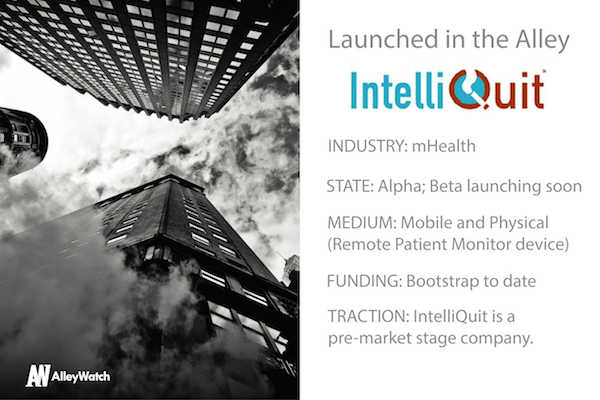Mark Twain once said that quitting smoking cigarettes was the easiest thing in the world – he’d done it a thousand times.
In case you missed the memo, smoking is not good for you and in case you missed the irony, quitting is not easy, either.
Luckily, IntelliQuit is changing all that. IntelliQuit is the first stop smoking biosensor platform and mobile app for the world’s 1.3 billion smokers, helping them to quit the same way they started – one puff at a time. CEO (and MS) Matthew Bars is here to fill us in on the ins and outs.
Tell us about the product.
IntelliQuit is the world’s first personal pocket size biosensor and ecosystem measuring tobacco consumption and severity of nicotine addiction. Similar to a weight scale for dieters or a blood glucometer for diabetics, IntelliQuit provides the smoker and his or her health care provider actionable information to support positive behavior change.
How is it different?
IntelliQuit is a first in class, evidence-based biosensor and mobile app platform designed by world leaders in the field of tobacco addiction. As a mobile health device linked with interactive behavioral biofeedback and a data driven treatment plan, IntelliQuit allows the smoker to quit the way they started – one puff at a time. Independent clinical research demonstrates that about half of all smokers prefer gradual or Reduction to Cessation protocols (also called Cut Down then Stop), and can engage more smokers and increase quit rates.
The IntelliQuit biosensor, which is the size of a butane lighter, informs smokers of the status of their biochemical tobacco consumption via expired breath carbon monoxide analysis, then communicates these results wirelessly via Bluetooth to the smoker’s smartphone and (if desired) their health care professional. Equivalent to a weight scale for dieters or a blood glucose meter for diabetics, IntelliQuit provides feedback to support positive behavior choices.
What market are you attacking and how big is it?
There are 46 million adult American smokers and1.3 billion worldwide. 65,000 Americans attempt quitting smoking each and every day.
What is the business model?
IntelliQuit has identified a number of market opportunities/ verticals. They include:
Direct to Consumer:
Internet & mobile sales
TV and Radio DTC response advertising
Big Box and other retail outlets
(We are in discussions with Walgreens)
Mobile Gaming
(Our mobile game will be offered as a freemium model and will
represent a significant opportunity to convert free users to
IntelliQuit customers)
Business to Business:
Leverage Management’s and Advisors’ professional and personal contacts
(e.g.: The company has verbal commitments
from the United Kingdom’s Trustee NHS/ Stop Smoking
Centers and Quitlines to purchase the IntelliQuit platform)
Tradeshows and conferences
Health care contract sales personnel mHealth ecosystems
(Validic, QualComm Life, etc)
Verticals:
Medical Centers/Hospital Systems, Affordable Care Organizations,
Medical Homes, Physicians, other Clinicians, Home Health Care
Governments (State, Federal & International)
Insurance Companies
Employers
Quitlines (US States and International)
What are the milestones that you plan to achieve within 6 months?
We will begin and complete medical centers/Quitline beta-testing with 3D printed devices. UX and feedback will solidify final form factor decisions. We anticipate our first production run within ~8 months and operational breakeven within ~10 months at ~2,500 units/month.
If you could be put in touch with one investor in the New York community who would it be and why?
We are looking for investors who are interested in the health care sector, specifically the power of mobile/ digital health. We are looking for smart money: investors who can contribute to other strategic and tactical partnerships and provide management input. Our ideal investor would be interested in ending the world’s tobacco pandemic.
Why are you launching in New York?
IntelliQuit is based in the NY area. Matthew “Matt” Bars, our CEO, is a native New Yorker.
Can IntelliQuit help us with our chocolate addiction?
Sorry, that’s the Startup 2 tables down on the right at TechCrunch Disrupt. I’m sending Tracy Miceli, our COO, there for a clinical intervention.





